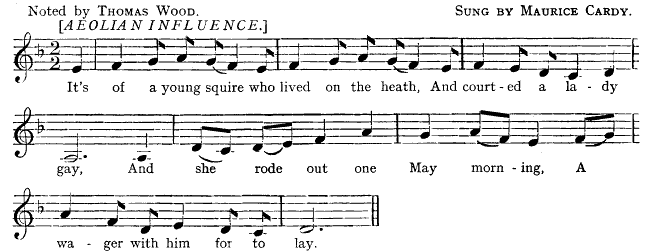The Young Squire- Cardy (Essex) c.1928
From: Folk Songs from the Essex-Suffolk Border
by Thomas Wood, Ralph Vaughan Williams, A. G. Gilchrist
Journal of the Folk-Song Society, Vol. 8, No. 33 (Dec., 1929), pp. 125-135
I HAVE spent some time during this year (1928-9) in trying to find folk-songs in the Stour valley. The results are not large. I have so far found only two men who were able to give the tunes and text of songs in anything like a complete form. They are both farm hands, and have lived in the Bures district all their lives. The first is Maurice Cardy, 70, of Bures St. Mary, the other William Sparkes, 50, of Hobbs' Well, Mount Bures. Both of them speak the beautiful north Essex dialect, with its careful sounding of the 'h,' the softening of the 'er' into 'ar,' the invariable use of 'that for 'it,' and the translation of all tenses into the present, with the plural ending. Both have some idea of singing, and both were much interested in what I wanted, when I had carefully explained what I was after. Cardy works for me for part of the year, when another man is required about the place, and Sparkes works on this land (which is rented by a neighbouring farmer), so that I see them constantly and had heard these songs many times before I noted them down. I have given them as sung, except that I have not attempted to show the vowel inflections.
August 20th, 1929. THOMAS WOOD.
10.--THE YOUNG SQUIRE
[THE BROOMFIELD HILL.]

1. It's of a young squire who lived on the heath,
And court - ed a la - dy gay,
And she rode out one May morn - ing,
A wa - ger with him for to lay.
2 A wager I will lay you, says she,
A hundred pounds to your ten,
A maid I will go to the merry broom-field,
And a maid return again.
3 And when she got there, her true love lay there,
Her true love lay fast in his sleep:
With his fine grey horse, and his fine saddle cloth,
And a bunch of green broom at his feet.
4 Three times she did knock, three times she did call,
Three times she did jingle the bell,
Saying wake, lover, wake, for your true love is here,
Or else she will soon be agone.
5 She picked the blossom off of the broom,
The blossom that smelled so sweet,.
And some she laid at the crown of his head,
And some at the sole of his feet.
6 And when she had done all she could do,
She took herself away,
And hid herself under a bonny bunch of broom,
To hear what her true love would say.
7 And when he awoke out of his fast sleep,
He wondered what smelt so sweet,
"Surely she has been here, my true love,
That I did appoint for to meet."
8 "Why don't you sleep more in the night,
And wake more in the day?
Had you been awake instead of being asleep,
Your true love would ne'er gone away."
9 "Had I been awake instead of being asleep,
And could not have gained my will,
All these wild birds on this bonny broom field,
This night should have had their fill.
10. Her blood should have been their drink for them,
Her flesh should have been their meat;
Her bones would have been their pillow by night,
When they lay them down to sleep."
I was interested to find this variant of the familiar story in these parts. Gestures again were used, but the singer had no difficulty with his modal tune. This song was sung by his mother sixty years ago; she used to plait straw for hats.- T. W.
Numerous tunes, versions, and annotations have appeared in the Journal. See Vol. iii, p. 69; Vol. iv, pp. 110-116 (where full references concerning the ballad will be found) ; Vol. vii, pp. 31-34 (with a further note by Miss Broadwood on the magical aspect of this ballad). Under the title of " The Broomfield Hill" Child prints six texts in his English and Scottish Ballads. He shows that the story is known in various European countries, and he deals with the magical rites illustrated by the strewing of the flowers of the broom at the knight's head and feet.
Dr. Wood's tune is different from all the other 'Broomfield' tunes in the Journal, though some of them have the characteristic drop in the melody at the end of the second strain. There is a pretty touch in the text of v. 7 which I have not seen in other versions. In Dr. Keith's Last Leaves of Traditional Ballads and Ballad Airs, collected by Gavin Greig, two " Broomfield Hill" tunes are given (p. 32) to both of which a curious and obscure refrain is attached, which may once have had a magical meaning, such refrains being often found in ballads where a maiden has to defend herself by her wits against a suitor of evil or demon character. See Miss Broadwood's -note on " The Seaside, or the Elfin Knight," Journal, Vol. iii, pp. I2-I6.- A. G. G.